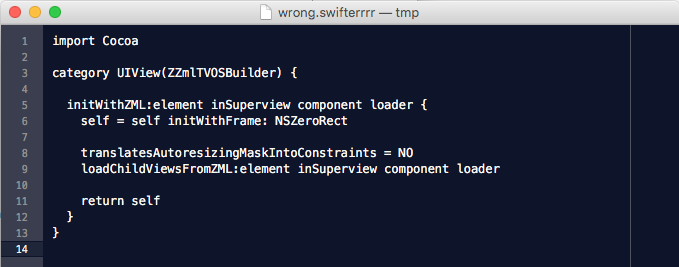Swifter Indentation
' ': The final frontier. Where no one has gone before.
Feel invited to get another glimpse on how Swifter
is getting everything right. Today we are looking at the ' ' and beyond.
Introduction
We at the ARI are not only right, but also honest: Of course someone has gone there before. But those who did should follow our lines in being honest and admit that they got it all wrong!
Let’s take a step back and look at what others are doing. One language which is famous for its indentation handling is Python. Though we are very pleased with many decisions in Python - what do we see in the very first paragraph looking at PEP-0008 Indentation:
Use 4 spaces per indentation level.
We don’t know what you see, but we see #FAIL. The only right indentation level is of course 2 spaces.
But some are ignorant of any NASA research whatsoever and write nonsensical things like this:

They use tabs - sure, do that! Did you spot the other hint that they are
out of their minds? Yes, they use vim instead of the only true
operating system: Emacs.
Swifter Rules
So what is the one right way?
- The right indent is 2 soft spaces.
- A
TABis always 8 spaces wide and is used for controlling line printers. They do not belong into source code (you don’t useCReither, do you?). You don’t know what a line printer is? You are too young to code, stop trying right away. - Maximum line length is 80. As outlined in RFC 2822.
Indent 2 Spaces
Using an indent of two spaces is a carefully researched compromise between DRY and WET.
Yes, by using two spaces we actually do repeat ourselves. But we only do it once unlike other wasteful approaches such as 4 space. Besides it is common wisdom that only even amounts of indentation are right, so 1 space is not an option.
One might correctly suggest that 0 spaces is the most efficient way to do indentation. This is very true, yet Swifter is designed to become the dominant mainstream language within 2014. Todays coderz are just not efficient enough to do 0 in production code.
Summary:
Two spaces is reasonably memory and CPU efficient. And they ' ' look nice as
well as compact!
It shows that you care and are 1337.
Tabs vs Spaces
Tabs are wrong - TABs falling from the sky, space stays - a rare proof shown on
Unsplash:

We mentioned already that it is common wisdom that the amount of indentation
has to be even. This implies that you can’t use just one TAB, your would need
to use two or four, etc.
We also outlined how TABs by definition are 8 spaces wide.
So how would the code look like? Like this:
class ImagesViewController : NSViewController {
IBOutlet tableView
viewDidLoad {
super
con = NSApp delegate. dockerConnection
log: "Con: %@" with: con
}
numberOfRowsInTableView: {
return representedObject. count
}
}
Summary: Tabs are wrong.
In fact it doesn’t seem irrational to claim that TABs in source code are
a conspiracy created by the producers of those beautiful
UltraWide monitors.
Implementation in the Swifter Compiler
As an ARI founding member announced end of last year:
Announcement: The #swifterlang cc is going to reject code containing tabs. Tabs are #FAIL. Can't decide between 500 500's and abort() on \t.
— Helge Heß (@helje5) December 30, 2015
Experience has shown that coderz are lazy and do not easily obey to the rulez.
As a consequence it is obvious that swifterc has to enforce proper
indentation.
Or n00bs will continue to send in incorrectly indented pull requests day after
day - even if you love where this is going.
We regrouped and discussed the matter. Throwing 500 500’s isn’t a bad idea for sure, but we at the ARI wanted the compiler to produce helpful, if not ignorant, warnings and error messages. Feedback is welcome!
Hard Error: Tabs
Imagine source code containing tabs, like:
[1] class ImagesViewController : NSViewController {
[2]
[3] IBOutlet tableView
This resulted in a lot of discussions given how ridiculous it is to use TABs in
the first place. Should the compiler just delete the source file (maybe only
if the -f or --fu switch is being passed to the compiler)?
We eventually agreed to copy error handling behaviour of Swift and do something
like this:
Assertion failed: ((!selfParam.isIndirectInOut() || (baseType.getSwifterRValueType()->isAnyClassReferenceType() && isa<ProtocolDecl>(accessor.getDecl()->getDeclContext()) && !cast<ProtocolDecl>(accessor.getDecl()->getDeclContext()) ->requiresClass())) && "passing unmaterialized r-value as inout argument"), function prepareAccessorBaseArg, file /Library/Caches/com.alwaysrightinstitute.xbs/Sources/swifterlang/swifterlang-1337.0.42.0/src/swifter/lib/SILGen/SILGenApply.cpp, line 3623.
0 swifter 0x0000000108a7db9b llvm::sys::PrintStackTrace(__sFILE*) + 43
...
6 swifter 0x0000000106c8f47f swifter::Lowering::SILGenFunction::prepareAccessorBaseArg(swifter::SILLocation, swifter::Lowering::ManagedValue, swifter::SILDeclRef) + 2191
7 swifter 0x0000000106cf26ab (anonymous namespace)::AccessorBasedComponent<swifter::Lowering::LogicalPathComponent>::prepareAccessorArgs(swifter::Lowering::SILGenFunction&, swifter::SILLocation, swifter::Lowering::ManagedValue, swifter::SILDeclRef) + 171
Hard Error: 4 Space Indent
Maybe the coder is converting some Python code to Swifter and accidentially used the 4 space indentation from the church of wrong:
[1] class ImagesViewController : NSViewController {
[2]
[3] IBOutlet tableView
Produces:
~/codez/wrong/test.sz:3:4: error: Waste of space!!!
IBOutlet tableView
^
Warning: Excessive Inline Spaces
Unrelated to indentation, hence a warning:
[1] class ImagesViewController : NSViewController {
[2]
[3] IBOutlet tableView
Gives:
~/codez/wrong/test.sz:3:13: warning: characters are too far away \
from each other
IBOutlet tableView
^
Warning: Class Declaration
Class declarations should be separated by 3 empty lines, if you don’t:
[1] class Item {
[2] }
[3]
[4] class Container {}
Gives:
~/codez/wrong/test.sz:3:0: warning: Proximity warning!!
}
=>>
class Container {}
Error: Loops
Incorrectly formatted loops:
[1] for (a in b) {
[2] a printIt
[3] }
Result:
~/codez/wrong/test.sz:3:13: warning: For loop is from outer space
}
^
Error: Exceeds max line length
[1] a = 5
[2] c = a + 1
An obvious:
~/codez/wrong/test.sz:2:<<NaN>>: error: Character boldly went \
where no character went \
before
}
^
Hard Error: Xcode indented your object literals
You know, the usual:
[1] NSDictionary<NSString *, NSArray<NSNumber *> *> * records = @{
[2] @"42": @[
[3] @3 ]
Result:
~/codez/wrong/test.sz:2:72: error: Undefined proximity!
@"42": @[
^
Runtime Indentation Error
Swifter code might produce formatted output, like JSON files and such. To ensure that the output is formatted properly, the Swifter runtime library contains appropriate checks:
[1] stdout print " n00b"
This will compile fine as the source itself is properly indented, but if you run the program:
zRight:~/codez/wrong/ i1337$ ./test
~/codez/wrong/test: Terminated. Runtime error: Illegal waste of \
space.
Error: Wrong IDE Color Configuration
Some n00bs misconfigure their editor. Fortunately swifterc is aware of the
environment a source file was produced in and will properly reject the code:

Gives:
~/codez/wrong/wrong.swifterrrr:ALL:ALL: error: Unless you are in \
space, space is \
white, not black, \
green or \
midnight blue.
Summary
The summary is short: Do indentation the right way! Don’t exceed the max line length! IDE background color is set to white.
Looking for a job?
Be sure to learn Swifter, it is the language of the future!
P.S.: Swifter Compiler
Some noticed that swifterc can’t be written in Swifter as the error messages
shown would crash with Illegal waste of space. runtime errors.
Now we could do it the Apple(tm) way and create different rules for swifterc
committers and ‘secondary’ developers.
Instead we already announced in June 2015 that the
Swifter compiler going to be written in Swift.